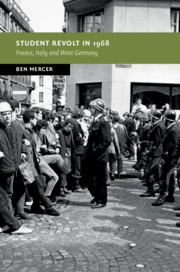Book contents
- Student Revolt in 1968
- New Studies in European History
- Student Revolt in 1968
- Copyright page
- Contents
- Acknowledgements
- Abbreviations
- Introduction: History, Myth and Memory of 1968
- Part I Education and Culture
- Chapter 1 The ‘Devouring Monster’
- Chapter 2 ‘New Managerial Class’ or ‘Social Doctor’?
- Chapter 3 ‘Books for All’
- Chapter 4 ‘Knowledge Is Over’
- Part II The Politics of Revolt
- Part III Crisis of the University
- Conclusion
- Select Bibliography
- Index
Chapter 2 - ‘New Managerial Class’ or ‘Social Doctor’?
The Ambiguities of Sociology
from Part I - Education and Culture
Published online by Cambridge University Press: 18 November 2019
- Student Revolt in 1968
- New Studies in European History
- Student Revolt in 1968
- Copyright page
- Contents
- Acknowledgements
- Abbreviations
- Introduction: History, Myth and Memory of 1968
- Part I Education and Culture
- Chapter 1 The ‘Devouring Monster’
- Chapter 2 ‘New Managerial Class’ or ‘Social Doctor’?
- Chapter 3 ‘Books for All’
- Chapter 4 ‘Knowledge Is Over’
- Part II The Politics of Revolt
- Part III Crisis of the University
- Conclusion
- Select Bibliography
- Index
Summary
Chapter 2 analyses the meaning of sociology in the 1960s. It traces the creation of the sociology degree in France, West Germany and Italy, and describes in detail the origins of the University Institute of Social Sciences in Trento. The chapter describes the first occupations in Trento over the discipline of sociology. The chapter shows how technocrats and modernisers envisaged in sociology a discipline that would provide managerial staff to administer and control social change. Students, however, most frequently chose sociology as a discipline that embodied a critical vision of contemporary society, personal emancipation and political change. I argue that this conflict explains the centrality of sociology to the revolts of 1968.
- Type
- Chapter
- Information
- Student Revolt in 1968France, Italy and West Germany, pp. 47 - 66Publisher: Cambridge University PressPrint publication year: 2019

